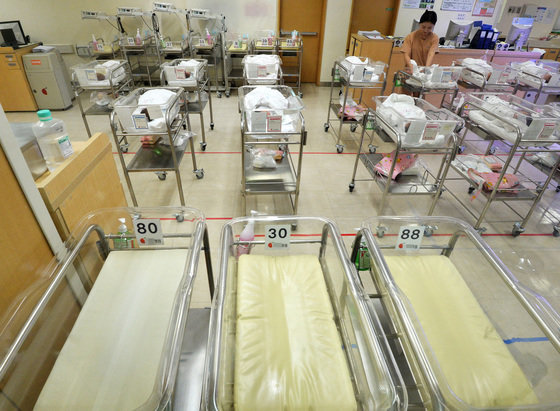April sees first rise in births in 19 months
April sees first rise in births in 19 months
Posted June. 27, 2024 08:11,
Updated June. 27, 2024 08:11

In April this year, the number of babies born increased by over 2 percent compared to the same month last year, marking the first rise in a year and seven months. Additionally, marriages, which are a key predictor of births, surged nearly 25 percent, the highest April increase on record. Despite these upticks, it is hasty to conclude that birth and marriage rates have definitively turned around, as there is a base effect due to previously low numbers.
According to Statistics Korea on Wednesday, 19,049 babies were born in April, a 2.8 percent (521) increase from the previous year. This is the first year-on-year rise since September 2022, which saw a marginal 0.1 percent increase. However, births from January to March this year declined, leading to a record low of 79,523 births in the first four months.
The number of marriages in April this year was 18,039, up 24.6 percent (3,565) from a year ago. This is the largest April increase on record. For all months, it is the highest level since October 2018 (26.0 percent). The increase in the number of marriages is attributed to the base effect of the record low in April 2023 and an extra weekday to register marriages.
Local government marriage subsidies have also contributed to the increase. "The growth rate is higher in regions with local government marriage subsidies," said a Statistics Korea official. For example, Daejeon saw a 44.1 percent rise in marriages, the highest regional increase in April. Daejeon has offered up to 5 million won in wedding subsidies to newlyweds since January, with couples aged 19 to 39 who have lived in the city for a certain period receiving 2.5 million won each, up to 5 million won per household.
However, sustaining this rebound remains uncertain. "Short-term measures related to the declining birthrate, including initiatives from the National Council for a Low Birth Rate and Aging Population, are unlikely to reverse the trend," said Jeong Jae-hoon, a social welfare professor at Seoul Women's University. "The pressure on children to compete is the fundamental problem."
"For immediate and significant impact, the program should focus on the middle class, where preparing for childbirth is relatively easier," said Lee Cheol-hee, an economics professor at Seoul National University. "Yet, the program must also be sustainable and inclusive of those facing difficulties in having children, which requires substantial resources."
세종=이호 number2@donga.com







